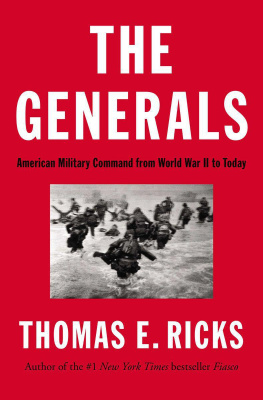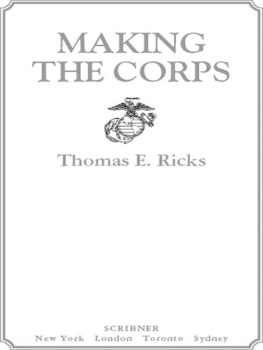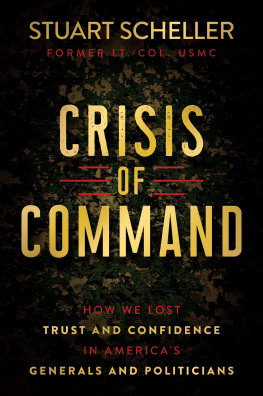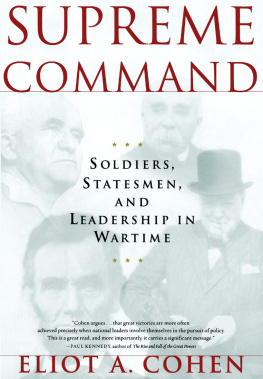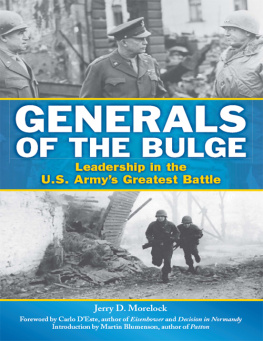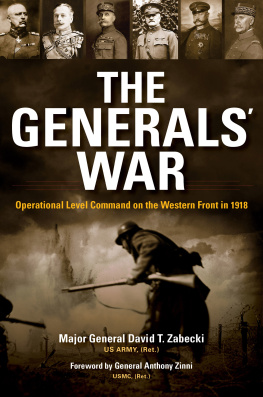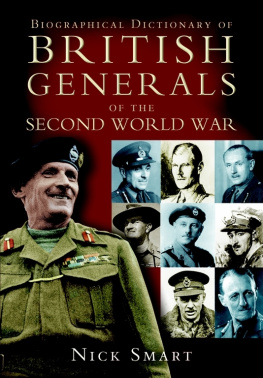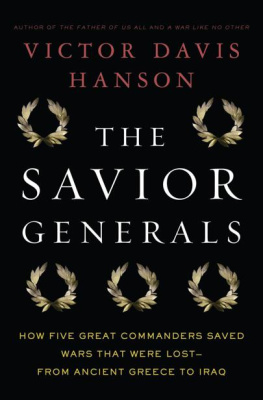ALSO BY THOMAS E. RICKS
The Gamble
Fiasco
A Soldiers Duty: A Novel
Making the Corps
THE
GENERALS
American Military Command from World War II to Today
THOMAS E. RICKS
THE PENGUIN PRESS
New York | 2012
THE PENGUIN PRESS
Published by the Penguin Group
Penguin Group (USA) Inc., 375 Hudson Street, New York, New York 10014, U.S.A. Penguin Group (Canada), 90 Eglinton Avenue East, Suite 700, Toronto, Ontario, Canada M4P 2Y3 (a division of Pearson Penguin Canada Inc.) Penguin Books Ltd, 80 Strand, London WC2R 0RL, England Penguin Ireland, 25 St. Stephens Green, Dublin 2, Ireland (a division of Penguin Books Ltd) Penguin Group (Australia), 707 Collins Street, Melbourne, Victoria 3008, Australia (a division of Pearson Australia Group Pty Ltd) Penguin Books India Pvt Ltd, 11 Community Centre, Panchsheel Park, New Delhi110 017, India Penguin Group (NZ), 67 Apollo Drive, Rosedale, Auckland 0632, New Zealand (a division of Pearson New Zealand Ltd) Penguin Books, Rosebank Office Park, 181 Jan Smuts Avenue, Parktown North 2193, South Africa Penguin China, B7 Jaiming Center, 27 East Third Ring Road North, Chaoyang District, Beijing 100020, China
Penguin Books Ltd, Registered Offices:
80 Strand, London WC2R 0RL, England
First published in 2012 by The Penguin Press,
a member of Penguin Group (USA) Inc.
Copyright Thomas E. Ricks, 2012
All rights reserved
Photograph credits appear .
Library of Congress Cataloging-in-Publication Data
Ricks, Thomas E.
The generals : American military command from World War II to today / Thomas E. Ricks.
p. cm.
Includes bibliographical references and index.
ISBN 978-1-59420-404-3
1. GeneralsUnited StatesHistory20th century. 2. United States History, Military20th centuryCase studies. 3. Command of troops History20th centuryCase studies. I. Title.
E745.R53 2012
355.0092'2dc23
[B]
2012015110
No part of this book may be reproduced, scanned, or distributed in any printed or electronic form without permission. Please do not participate in or encourage piracy of copyrighted materials in violation of the authors rights. Purchase only authorized editions.

For those who died following poor leaders
There are no bad soldiers, only bad generals. Saying attributed to Napoleon
CONTENTS
PROLOGUE
Captain William DePuy and the 90th Division in Normandy, summer 1944
C aptain William DePuy of the 90th Division saw it all in northwestern France in the summer of 1944.
On June 13, 1944, a few days after the 90th Infantry Division went into action against the Germans in Normandy, Lt. Gen. J. Lawton Collins, to whom the division reported, went on foot to check on his men. We could locate no regimental or battalion headquarters, he recalled with dismay. No shelling was going on, nor any fighting that we could observe. This was an ominous sign, as the Battle of Normandy was far from decided, and the Wehrmacht was still trying to push the Americans, British, and Canadians, who had landed a week earlier, back into the sea.
The 90ths assistant division commander, Brig. Gen. Hanging Sam Williams, also was looking for the leader of his green division. He found the division commander, Brig. Gen. Jay MacKelvie, sheltered from enemy fire, huddling in a drainage ditch along the base of a hedgerow. Goddammit, General, you cant lead this division hiding in that goddamn hole, Williams shouted. Go back to the CP. Get the hell out of that hole and go to your vehicle. Walk to it, or youll have this goddamn division wading in the English Channel. The message did not take. Within just a few days the division was bogged down and veering close to passivity. Orders may have been issued to attack, but no attacks took place, remembered DePuy. Nothing really happened. Infantry leaders were totally exhausted and in a daze. There was a pervasive feeling of hopelessness.
In June 1944, DePuy was fighting to stay aliveno small feat in the bloody, World War Ilike combat of that summer. One infantry company in the 90th began the day with 142 men and finished it with 32. Its battalion commander walked around babbling, I killed K Company, I killed K Company. Later that summer in Normandy, one of the 90ths battalions, with 265 soldiers, surrendered to a German patrol of fifty men and two tanks. In six weeks of small advances, the division would use up all its infantrymen, requesting replacements totaling 100 percent. The average term of service for a 90th Division lieutenant leading a platoon in combat was two weeks. The 90th Division in Normandy, DePuy would remember bitterly, was a killing machineof our own troops.
Gen. Collins relieved MacKelvie. In the relief order, Gen. Collins wrote that the divisions enemy opposition had been relatively light, probably less than a regimental combat teama blistering aside. Collins instructed the 90ths new commander, Maj. Gen. Eugene Landrum, to fire the commanders of two of the divisions three regiments. DePuy considered one of those two, West Point graduate Col. P. D. Ginder, a horses ass of the worst order. Goddamned fool... he was a disaster. DePuy was hardly alone in his estimate of Ginder: Another officer, Lt. Max Kocour, a mortar forward observer, remembered that the regimental commander almost constantly made the wrong decisions. Indeed, even after being relieved, the excitable Ginder continued to issue orders, at one point sending troops forward into an artillery target area without seeking permission or coordinating the movement, an action for which he was placed under arrest and sent back to division headquarters under armed escort. Ginder had been in command of the regiment for less than a month. His successor, Col. John Sheehy, was killed in an ambush after two days in command.
Col. George Barth took command of Ginders regiment after Sheehys death. One day he saw a long column of perhaps eight hundred men and asked DePuy which battalion they were. That was no battalion, DePuy repliedit was the days incoming replacements for the divisions casualties. Barth later confessed that, before taking over the regiment, he had never before experienced zero morale.
MacKelvies successor, Landrum, was given a few weeks to prove he was an able commander, but by midsummer he also was judged to be wanting. Gen. Omar Bradley, the senior American general in France at the time, decided to replace Landrum with Brig. Gen. Theodore Roosevelt Jr., the son of the former president, whom he had sacked a year earlier as assistant commander of the 1st Infantry Division under Maj. Gen. Terry Allen. But the night before he was given the job, Roosevelt died of a heart attack. Landrum was eventually removed as the commander of the 90th, though before he left, he fired the assistant division commander he had inherited, Brig. Gen. Sam Williams, with whom he had clashed. I feel that a general officer of a more optimistic and calming attitude would be more beneficial to this division at this time, Landrum wrote. Bradley concurred and topped off the dismissal by demoting Williams to colonel.
The swift reliefs of World War II were not an instrument of precision, and, while often effective in leading to more capable commanders, they were sometimes clearly the wrong move. Other officers watched and assessed the fairness of such firings. In the case of the 90th Division, the consensus was that the removal of MacKelvie was fully justified but that Ginder and Landrum probably deserved better, and that Williams certainly did. This peer judgment resulted in Ginder, Landrum, and Williams being given second chances. Ginder was assigned to the 2nd Division later that year as a spare commander and redeemed himself with a strong battlefield performance on Elsenborn Ridge, key terrain during the Battle of the Bulge. He was awarded the Distinguished Service Cross for his acts during the grinding Battle of Hrtgen Forest and was given command of the 2nd Divisions 9th Infantry Regiment. During the Korean War, he would rise to command the 45th Infantry Division and make news by giving a battlefield tour in his helicopter to the pop singer Eddie Fisher, who had been drafted but was continuing to pump out hits. Even a commander escorted from the battlefield under arrest could recover. In 1963, Ginder retired as a major general.
Next page
